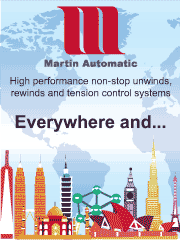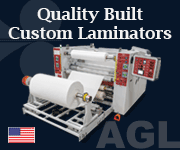French Fry Fascination Brings Big Business to Bonar
- Published: April 01, 2000, By Teresa Koltzenburg, Senior Editor
Two Black Clawson coextrusion lines bring Bonar into the world of institutional french fry packaging. And what a big world it is.
What did you have for lunch today? If it was fast food, it very likely included french fries. If so, you weren't alone. Despite the fact that most Americans are trying to eat healthier, the reality is Americans love french fries—or so the numbers indicate. Half of all the vegetable servings consumed by Americans are potatoes, and half of those are french fries, reports a 1998 Associated Press article. And since Canada is home to the largest processor of french fries in the world (McCain Foods Ltd.), it seems Canadians are no slouches either when it comes to their consumption of the crispy, tasty potato concoction.
Nutritionists may not be encouraged by these findings, but Bonar Inc., Calgary, AB, Canada, isn't complaining. Ross Barrett, Bonar's general manager, says this converting operation supplies more than 25% of the institutional french fry packaging to North America, no small feat considering that 4.5 billion lb of french fries are sold annually in the US alone.
"Small" doesn't seem to be a word in Bonar's vocabulary. Housed in a massive 277,000-sq-ft facility, the Calgary operation, notes Barrett, consumes 40,000 metric tons (44,000 short tons) of paper/yr. The plant also has invested $22 million dollars (Canadian) in capital in the last four years. Bonar in Calgary is now the home to two Black Clawson coextrusion coating lines, two Deacro slitter/rewinders, and a bag machine from Windmoeller & Hoelscher.
French Fries and More
Bonar's Calgary facility, which opened its doors in 1976, is one of eight packaging plants operating under the name Bonar Inc. The company was formerly owned by Scotland-based Low & Bonar Group and is now (as of March 2000) owned by The Hood Companies, which is based in Hattiesburg, MS.
The converting operation has two distinct product lines, says Barrett. "One is multiwall paper bags. In this area, we produce paper bags for the flour/bakery mix industry, pet and animal feed, chemicals/minerals, sugar, and rock products. The other product line is the extrusion coated products, which would include the french fry packaging. We also produce coated and laminated paper products for paper mill packaging supplies, food packaging, and automotive masking paper."
Prior to 1996, the facility had two coating lines, a 60-in. Egan coater/laminator and a proprietary 106-in.-wide coater/laminator. Each coater includes an in-line two-color flexo press. (All of Bonar's inks are supplied by Flint Ink.)
In 1995, reports Barrett, the operation began looking for a new coextrusion coating line to expand capabilities. "We surveyed the marketplace and narrowed it down to Black Clawson and one other supplier. What really impressed us about Black Clawson was its die technology—the rigid-lip die versus the flex-lip die. We thought the rigid lip would be advantageous. We decided to give it a go and installed the 72-inch Black Clawson line in early 1996."
Only a year-and-a-half later, Barrett says he and his colleagues realized the operation needed even more capacity. "We had done so well in the french fry industry that, essentially, we were sold out. We began to look for another coating line, and although we did look at another supplier's equipment, we realized there would be a tremendous advantage in going with Black Clawson: Our operators knew the machine, and we knew the installation. Another factor in choosing Black Clawson again was the proven reliability of the equipment. The machines just run and run and run. We don't have any problems."
Bonar installed the second Black Clawson coextrusion line in 1998. "The first pieces of this 65-inch-wide line arrived around Labor Day that year," Barrett recalls, "and by mid-November we put the first resin and paper through the machine. We were selling commercial products off the line by Christmastime."
Both lines run at speeds to 1,500 fpm and were designed to apply polypropylene and polyethylene to natural or bleached kraft papers. Equistar, Dow, Nova, and Westlake supply the plant's resin, and Bonar buys its paper from Canfor, Eurocan, Tolko, and several other paper suppliers.
The Coextrusion Course
Bonar's process on its two Black Clawson lines starts with an individually adjustable turret unwind. Handling rolls up to 52 in. in diameter and weighing up to 5,000 lb, the Model 20 Black Clawson unwind provides precise unwind tension and speed control to ensure consistent, repetitive splicing in conjunction with the Black Clawson Model 511 Splicer, Barrett reports.
He adds that splices are painstakingly accurate, thanks to the automatic tension control system. A DC motor system accelerates rolls to match machine speed, helping to eliminate tension upsets at splicing.
"Consistent splicing is imperative to our operations," says John Hazen, an operator on the number two Black Clawson Line. "One missed splice means we need to replace our rolls, and that can mean up to four hours of missed production time."
The Black Clawson Model 400 water-cooled extruders sit on an x-y-z carriage base, which enables in-and-out, side-to-side, and up-and-down movement. According to Ed Carne, technical manager of coating, this x-y-z movement ensures precise placement of the die and melt stream over the chill roll.
The proprietary Black Clawson screws, says Carne, were designed specifically for the materials Bonar uses and include both dispersive- and distributive-mixing capability, assuring Bonar of consistently mixed, gel-free extrudate.
The webs on these lines are fed into the Black Clawson Model 111 extrusion coaters, each of which is outfitted with a rigid-lip die. "We like the ease of adjustment that this type of die offers," states Barrett. "It provides a consistently flat profile, accurate control over resin flow, and reliable deckle sealing. This means our operators don't need to tweak the die bolts in order to reach accurate profile."
Coated product is wound on the Black Clawson Surfastart 1000 Winder. The Surfastart provides consistent and continuous winding of large diameter rolls, reports Carne. "The winder is a real workhorse; our rolls are wound with consistently smooth edges."
Both coating lines are supervised by Black Clawson's Integrator II Supervisory Control System. The Integrator provides operators with a graphics-based single window to monitor all operations and components of each line. The system allows for more than supervision of the line, notes Carne. It includes quality tracking, historical-data trending, and recipe-management features as well.
Black Clawson already has completed consecutive improvements to the lines' control systems. "The basic principals of the Integrator remain the same, so training doesn't become an issue," Carne adds. "Black Clawson upgrades the Integrator with converters and operators in mind, knowing that training takes time and money. Each upgrade to the Integrator complements already established design criteria and parameters."
Machinery Multitude
Bonar purchased two Deacro slitter/rewinders to work in-line with the coaters. "To go along with these slitter/rewinders, we built robotic roll-handling equipment," Barrett notes. "This proprietary equipment removes the rolls from the slitters and puts them onto the pallets. Actually, this equipment is really slick. We're getting two 250-pound rolls off every six-and-a-half minutes."
An array of other equipment fills Bonar's huge facility. The plant also owns two Dusenbery slitter/rewinders, which are utilized for the automotive masking industry.
Barrett says W&H provides the operation's equipment for its bagmaking production. "We have two tubers and four bottoming machines for the various bag styles. Our newest W&H acquisition is a completely integrated tuber/bag machine/palletizer that takes rolls of paper at one end and delivers pallets of finished paper bags at the other end." He adds that this integrated line is equipped with a Strong-Robinette two-color flexo press.
Barrett also reports that all of the facility's coaters include corona treating equipment, which was manufactured by Sherman Treaters and Pillar Technologies.
ERP on the Way
Bonar currently is in the midst of implementing an ERP (enterprise resource planning) system. The company's interest in an ERP system stemmed from the infamous Y2K issues that made headlines before the onset of 2000.
Barrett explains: "Some of our other sites had generations of software that were not Y2K compatible. The ERP system is an opportunity to get the whole organization to use software that is interchangeable from branch to branch. We're all working off of a server at our Burlington, Ontario, head office, and the database is now central. The system makes reporting uniform across all the branches."
Planning and implementing the ERP system has been no small task either, he adds. "Right now we have the front end done-the accounting and order-entry sales. We're in the middle of putting shop-floor data collection in right now. It's a massive project, but we hope to have that completed by the end of this year." QAD manufactured Bonar's ERP software, and the shop-floor data collection part of the system is from Freedom Technologies Corp.
As for Bonar's future plans, Barrett says the company's recent change in ownership makes predictions difficult. "We have to learn the new rules of the game before we go and expand. But," he adds, "we're looking at putting in additional multiwall converting capacity at this site sometime in the near future." Barrett says the company is considering coating metallocene in multilayers on paper. "We're looking into more exotic resin structures to replace traditional polymers. This could be beneficial in terms of reduced coating weights and improved sealing strengths."
One thing is certain, however: French fry packaging production at Bonar is at full throttle. And from the looks of North America's continuing fascination with the potato treat, it seems Bonar will be in the french fry packaging business for a while to come.
Supplier Information
Black Clawson, Fulton, NY; 315/598-7121; blkclawson.com
Windmoeller & Hoelscher Corp, Lincoln, RI; 401/333-2770; whcorp.com
Deacro Industries Ltd., Mississauga, Ont., Canada; 905/564-6566; deacro.com
Davis-Standard Egan, Somerville, NJ; 908/722-6000; davis-standard.com.
Flint Ink Corp., Detroit, MI; 313/538-6800; flintink.com
Equistar Chemicals, Houston, TX; 713/652-7300
Westlake Plastics Co., Lenni, PA; 610/459-1000; fax: 610/459-1084
Dow Chemical Co. Chemicals & Metals Div., Midland, MI; 517/832-1465
Nova Chemicals Corp., Calgary, Alb., Canada; 403/750-3600; fax: 403/269-7410
Tolko Industries Ltd., Vernon, B.C., Canada; 250/545-4411; fax: 250/545-5133
Canfor Corp, Vancouver, B.C., Canada; 604/561-5241; fax: 604/661-5235
Eurocan Pulp & Paper Co., Vancouver, B.C., Canada; 604/895-2750
John Dusenbery Co., Randolph, NJ; 973/366-7500; dusenbery.com
The Robinette Co., Bristol, TN; 215/258-6303; fax: 215/258-6304
Sherman Treaters Ltd., Oxon, OX, U.K; +44 1844 213686; shermantreaters.co.uk
Pillar Technologies, Hartland, WI; 414/367-3060; pillartech.com
QAD, Carpinteria, CA; ph: 805/684-6614
Freedom Technologies Corp., Brighton, MI; 810/227-3737.











